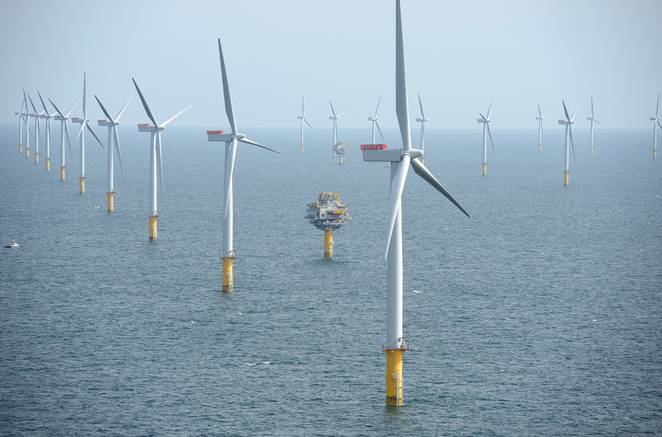
Date: 2025-07-10 Page is: DBtxt003.php txt00012935
Country / GHG Emissions
UK ... CO2 emissions
UK's 'Victorian era' CO2 emissions achieved without driving up energy costs
Burgess COMMENTARY
Peter Burgess
UK's 'Victorian era' CO2 emissions achieved without driving up energy costs
Energy / Energy Policy

uk wind farm CC BY-NC-ND 2.0 Statkraft
It was recently reported that UK emissions are now as low as they were when Queen Victoria was in power. That's an incredible achievement. And given the very real societal, environmental and economic costs of climate change and air pollution, it's an achievement that should easily pay for itself even if energy bills rise as a result.
But here's the thing: The low carbon transition hasn't actually pushed up bills.
As Business Green reports, analysis from the Committee on Climate Change (CCC) has revealed that while the direct costs of subsidizing renewables and energy efficiency programs have added £9 (around US$11 in post-Brexit Britain) per month to the average household energy bill in 2016. But that added cost was more than offset by a £20 decrease attributed to increased energy efficiency gains—gains that have in large part been supported by the subsidies for efficiency.
This is very good news. While pro-fossil fuel special interests continue to decry the costs of going green, the fact is that an aggressive push for renewables and efficiency ought to help the average pocketbook. And that's before you even factor in the negative costs of pollution that'll disproportionately impact lower income communities.
In many ways, it's the same story in the States. While car companies successfully lobby for gutting fuel efficiency standards—and cite upward pressure on car prices as justification—the real truth is that car prices are rising primarily because of gadgets, gimmicks and additional safety features. Consumer groups have been adamant that stricter fuel economy standards will help, not hurt, the average car buyer.
James Murray, editor of Business Green, is unequivocal in his opinion of what reports like this mean for the green economy. And he directly contrasts this vision with the short-term, anti-environmentalist thinking which is prevalent in some parts of the world:
'President Trump is continuing with his semantic-bending experiment to deliver clean air and water by torching air and water regulations. But Spring is coming, the sun is shining, and quietly, inexorably, the idea that a genuinely sustainable economy can be delivered is starting to look less like an environmentalist pipe dream and more like the inevitable by-product of an unstoppable technological revolution.'
Let's just hope we get there fast enough.
-------------------------------------------------
Related on TreeHugger.com:
UK CO2 emissions fall to Victorian-era levels
UK CO2 emissions fall to Victorian-era levels
Sami Grover
Sami Grover (@samigrover)
Energy / Energy Policy
March 7, 2017
Share on Facebook
Queen Victoria photo
© Greenpeace
UK carbon emissions sank by 6% in 2016. That figure alone suggests impressive progress. But dig a little deeper into the numbers and there's a rather astounding fact:
The last time emissions were consistently that low (381m tonnes last year), Queen Victoria was still sitting on the throne and the motor car had barely been invented. (I say consistently, because general strikes in 1920s led to two sudden, but brief slumps in emissions.)
That's according to newly released analysis by UK-based Carbon Brief, which points to a whopping 52% drop in coal consumption as the primary culprit for this encouraging development. The analysis—based on data from the UK government and the World Resources Institute—includes some fascinating charts that allow you to explore how emissions have changed over time.
There's another rather astounding fact hidden in these numbers: This impressive drop in emissions occurred even as oil and natural gas enjoyed a modest bump in consumption. (+1.6% and +12.5% respectively.)
So the question then becomes this: How much do emissions fall if oil—and eventually natural gas—start to hit turbulence too. It's true to say that coal has had a particularly tough time of late. From stricter emissions standards to lower natural gas prices and increasingly competitive renewables, baseload coal plants have had a hard time keeping up. But such troubles tend to create a vicious cycle—so once coal began to decline, a combination of investor skittishness and reduced policy leverage meant the slump picked up momentum faster than many of us would have imagined.
I've argued this before, but I believe there's good reason to think that oil may soon face similar pressures. Whether it's the growth in electric car sales, increased spending in non-car infrastructure, the spread of ultra low emissions zones in major cities, the rapid adoption of electric buses or the growth of non-car ownership, there are a confluence of forces emerging which may soon start to squeeze oil from all sides.
If such an oil squeeze does come to pass, it will be fascinating to see what happens to UK carbon emissions then.